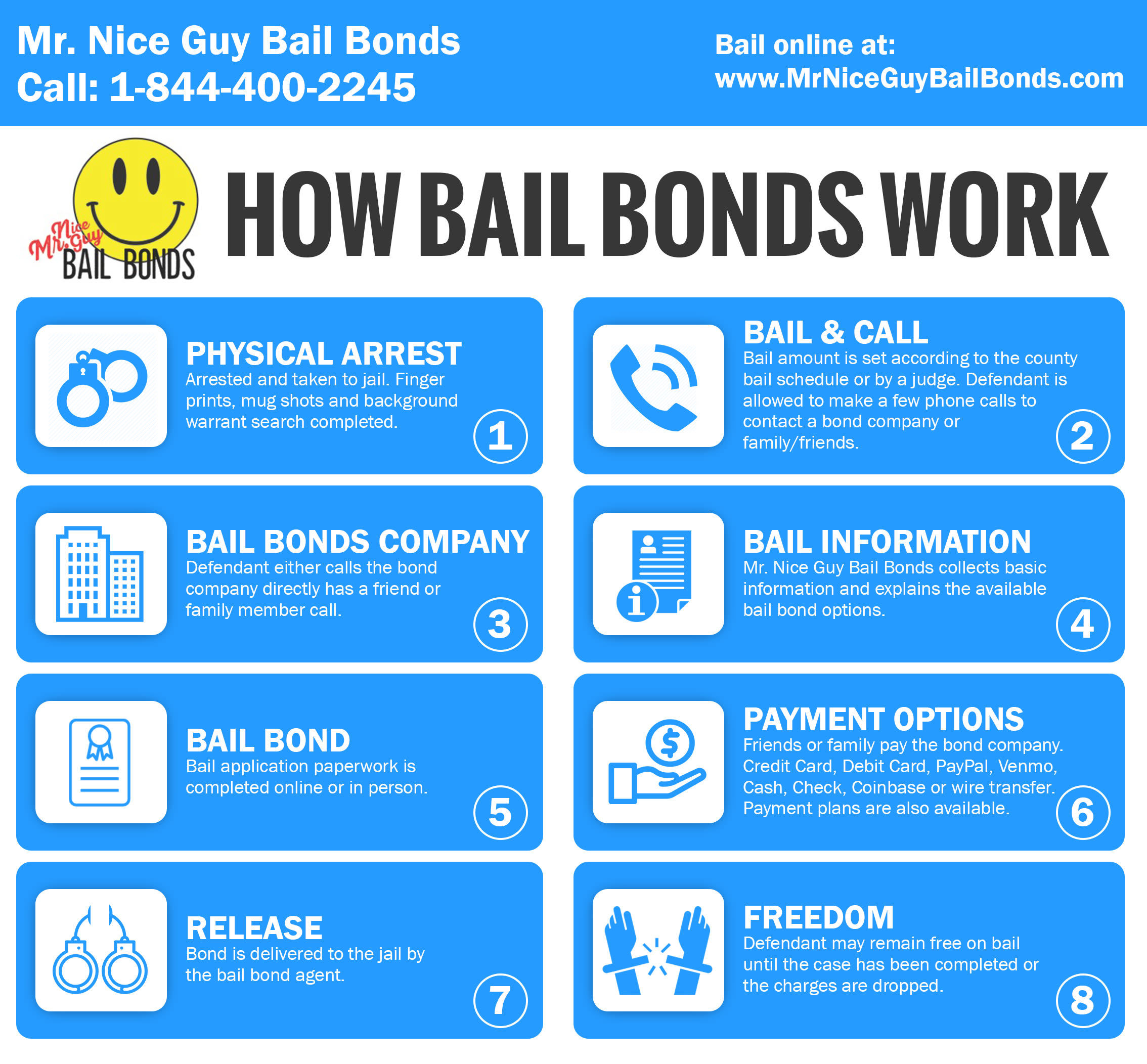Debunking Bail Bonds: Your Total Resource for Legal Assistance
Browsing the world of Bail bonds can usually appear like a challenging and complicated job for people unfamiliar with the legal system. From understanding the ins and outs of the Bail bonds procedure to the different types of bonds readily available, there is a myriad of information that can be overwhelming to digest.
Recognizing Bail Bonds Process
To understand the details of the Bail bonds process, one need to first realize the fundamental steps entailed in protecting a bail bond. The quantity of Bail established by the court may be past the financial means of the defendant or their household.
A bail bond is a surety bond given by a bail bond representative in behalf of the defendant. The bail bond representative bills a non-refundable charge, usually a percent of the complete Bail quantity, to upload the bond and protect the release of the offender. The bail bond representative additionally tackles the responsibility of guaranteeing that the accused appears in court as required. If the accused stops working to appear, the bail bond representative might be required to pay the complete Bail amount to the court. Comprehending the procedure of securing a bail bond is critical for those navigating the lawful system and looking for temporary flexibility while waiting for trial.
Kinds Of Bail Bonds Available
Having actually comprehended the essential actions associated with securing a bail bond, it is necessary to consider the different sorts of Bail bonds available to defendants in the legal system. The most common type is a money bond, where the offender or a person on their behalf pays the full Bail amount in cash money. This amount is returned once the accused meets their court commitments. One more choice is a surety bond, which includes a bond representative or Bail bondsman uploading the full Bail amount in exchange for a fee, normally around 10% of the overall Bail. Residential property bonds, on the various other hand, permit offenders to make use of valuable possessions like property to safeguard their launch. Federal Bail bonds specify to instances entailing federal fees and run under various regulations than state Bail bonds. Last but not least, launch on recognizance (ROR) is a sort of bond where the defendant is launched without having to pay Bail yet promises to attend all court hearings. Recognizing these various sorts of Bail bonds can aid defendants browse the legal process more efficiently.
Aspects Influencing Bail Amount
Different aspects play a considerable function in establishing the Bail quantity set for a defendant in the lawful system. Extra serious offenses generally result in higher Bail amounts YOURURL.com to guarantee the accused's appearance in court.
Another factor that can affect the Bail quantity is the defendant's ties to the community. Solid community connections, such as steady employment, household partnerships, and a background of home in the location, might lead to a reduced Bail quantity. Alternatively, individuals with very little connections to the community might encounter a higher Bail total up to avoid them from leaving the territory.
Additionally, the court considers the defendant's financial resources when identifying Bail. The ability to pay the Bail quantity set can significantly affect the decision. On the whole, a combination of these factors is thoroughly assessed to identify a ideal and fair Bail amount for every individual case.
Duties of the Defendant
Upon being launched on Bail, the accused presumes details duties that are essential to their legal process. Failure to appear can result in the abrogation of Bail and added lawful consequences (bail dayton ohio).
In addition, the accused must abide with any conditions established by the court or the Bail bond agency. These conditions might consist of restrictions on traveling, requirements for medicine testing, or prohibitions on contacting specific people. Complying with these conditions is vital to maintaining good standing with the court and ensuring a smooth legal process.
Additionally, the accused is accountable for informing their attorney and the court of any kind of modifications in call information or situations that may impact the situation. Open communication is essential to efficiently navigating the legal system and upholding the terms of the Bail agreement. By fulfilling these responsibilities, the defendant can demonstrate their commitment to settling the lawful matter at hand.
Legal Implications of Bail Bonds
Navigating the intricacies of Bail bonds entails understanding the potential legal ramifications that can occur throughout the procedure. When an accused safeguards a bail bond, they become part of a lawful agreement with the bondsman. Failing to follow the problems state in this arrangement can have major repercussions. If the defendant does not show why not try here up in court as required, the bail bond can be waived, causing the loss of the collateral or money set up for the bond.
Furthermore, if the offender goes against any various other regards to the bail bond contract, such as devoting one more offense while out on Bail, they might face added legal Going Here costs and charges. It is important for accuseds to totally comprehend their obligations when getting a bail bond and to stick strictly to the specifications to prevent additional legal complications.

Conclusion

To understand the complexities of the Bail bonds process, one have to initially realize the fundamental steps involved in protecting a bail bond.A bail bond is a surety bond provided by a bail bond representative on behalf of the defendant. The bail bond agent charges a non-refundable cost, typically a portion of the overall Bail amount, to upload the bond and protect the launch of the defendant.Having recognized the basic actions involved in safeguarding a bail bond, it is necessary to think about the different types of Bail bonds offered to accuseds in the lawful system. One more option is a surety bond, which includes a bail representative or Bail bondsman uploading the full Bail amount in exchange for a charge, generally around 10% of the complete Bail.